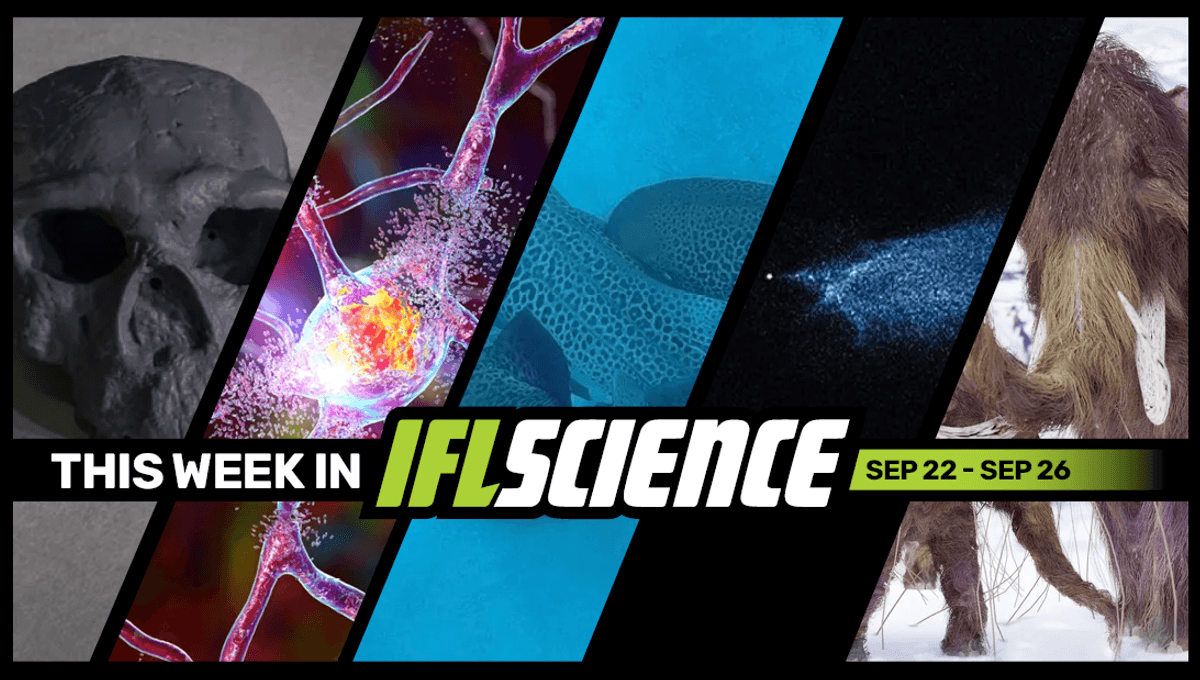Homo Sapiens' Origins Pushed Back 400,000 Years, First-Ever Successful Huntington’s Disease Treatment, And Much More This Week

Homo Sapiens' Origins Pushed Back 400,000 Years, First-Ever Successful Huntington’s Disease Treatment, And Much More This Week
This week, some saucy leopard sharks have been caught having a “threesome” in a world-first sighting, NASA has proposed blowing up an asteroid to prevent it from hitting the Moon, and fossils of hybrid mammoths suggest interbreeding was happening for thousands of years. Finally, we ask: why are humans so smart, and how did our brains get to be so big?
The rest of this article is behind a paywall. Please sign in or subscribe to access the full content. Until recently, it was thought that Homo sapiens and Neanderthals split off from their last common ancestor around 600,000 years ago, but a prehistoric skull from China has just shattered that narrative. Dated to 1 million years ago, the cranium belongs to an extinct human clade that encompasses the Denisovans, indicating that we had already branched off from our sister lineage prior to this point. Read the full story here An experimental new gene therapy for Huntington’s disease has shown promising results in phase I/II trials, with 75 percent less disease progression observed in the patients receiving the treatment. If further trials continue to produce such positive results, we could be looking at a remarkable breakthrough for this incurable, life-limiting disease. Read the full story here Inaccessible environments and secretive species make discovering certain aspects of animal biology challenging. However, new research has revealed something surprising about the mating habits of leopard sharks. Never-before-seen behavior filmed in the wild has shown that in the leopard shark world, it takes more than two to tango. Read the full story here A large asteroid strike on the Moon could have negative consequences for Earth, from the artificial satellites we depend on to the ISS. Now, a NASA-led team has looked into the options for preventing Asteroid 2024 YR4 from making such an impact in 2032. Contrary to the usual conclusions that asteroids should be diverted, not destroyed, they think this is a time for a Hollywood-approved demolition event. Read the full story here Mammoth species in North America repeatedly interbred over thousands of years, creating hybrid offspring, a new fossil analysis has revealed. The findings alter what we know about the evolution of these Ice Age giants and how they responded to dramatic climate shifts. Read the full story here The human brain is a hefty thing. Weighing well over a kilo, it’s an electrified lump with the texture of silken tofu, and yet within its innumerable connections is coded everything that we are. That wasn’t always the case, however. In fact, among the earliest lifeforms, eyes actually evolved before the brain. In our exclusive interview ahead of new show Secrets of the Brain, we asked Jim Al-Khalili how exactly did we get to the human brain? And why are we so much more cognitively advanced than other mammals? Read the full story here Have you seen our e-magazine, CURIOUS? Issue 38, September 2025, is available now. This month, we asked, “Are Space-Made Medicines The Future?” – check it out for exclusive interviews, book excerpts, long reads, and more. PLUS, the We Have Questions podcast – an audio version of our coveted CURIOUS e-magazine column – continues. In episode 13, we ask, “Can Transplants Change Your Personality?” The Big Questions podcast has returned, and we’re continuing season 5 with episode 8’s big question: Is De-Extinction Really Possible?Create an IFLScience account to get all the biggest science news delivered straight to your inbox every Wednesday and Saturday.
Million-Year-Old Skull Pushes Back Homo Sapiens' Origins By 400,000 Years
First-Ever Successful Huntington’s Disease Treatment Slows Progression By 75 Percent
In World First Sighting, Saucy Leopard Sharks Caught Having "Threesome" On Seafloor
NASA Proposes Blowing Up Asteroid 2024 YR4 So It Doesn't Hit The Moon
Hybrid Mammoth Fossils Discovered In Canada Reveal Thousands Of Years Of Interbreeding
TWIS is published weekly on our Linkedin page, join us there for even more content.
Feature of the week:
Why Are Humans So Smart? It All Began With A Bump
More content:


